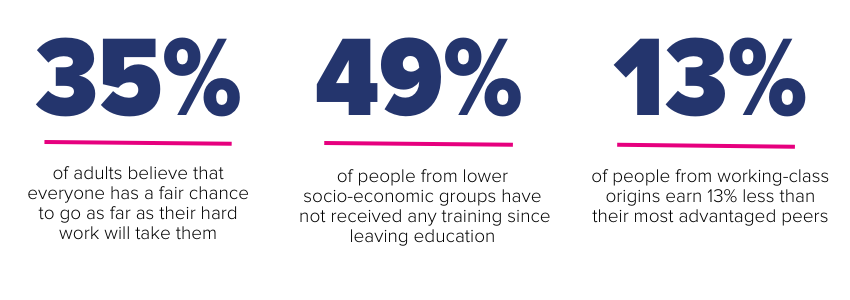Social Mobility
In the UK, a person’s social background limits their work opportunities, which is further compounded by factors such as race, gender, age, and location.1
Business in the Community (BITC) is uniquely placed to tackle social mobility and deliver transformative change with our national reach, breadth of expertise, and ability to positively impact both businesses and communities. Our expertise enables us to support businesses in addressing social mobility through different lenses, from education and communities to workplace inclusion and progression, creating systemic change where possible.
How Business in the Community drives social mobility
The determinants of social mobility are complex, and we support businesses to create the greatest impact based on their business model, industry, and products and services. This includes targeted action to address the underlying causes of systemic exclusion.
We encourage and work with all BITC members to engage with our ‘Inspire, Hire and Grow’ employment framework, which prioritises support for disadvantaged communities, data-driven decision-making, and leadership from the top.
- Collective action campaigns and programmes: We promote inclusive recruitment practices and workplace cultures through our collective action campaigns and programmes. We also support young people and jobseekers across the UK in developing the skills and confidence needed to access quality employment opportunities.
- Place-based action: Our work in some of the UK’s most disadvantaged places creates coalitions of stakeholders working to ensure systemic change. This involves addressing multiple factors contributing to poor social mobility, creating greater opportunities, and directly supporting young people’s education and career development through business-led initiatives.
- Advisory support: Our in-depth advisory and consultancy support enable businesses to address inclusion and inequality across the UK through their specific context, resulting in interventions to drive long-term, sustainable improvements in social mobility.
- Knowledge and content: We offer valuable research, factsheets, and toolkits that provide insights into effective action, supported by practical business case studies.
Delivering Social Mobility Programmes across the UK
Our national and regional employment programmes provide targeted support to jobseekers facing exclusion from work, including refugees, over 50s and young people not in education or training. Our flagship Job Coaching programme connects jobseekers with trained coaches from leading UK businesses. Through a series of 1:1 coaching sessions, jobseekers receive support to improve their skills, confidence and job outcomes.
Our Opening Doors campaign, based on five keys for inclusive recruitment, aims to make two million roles more inclusive by 2025. This builds on the success of our longstanding Ban the Box campaign, which has made over 1.1 million jobs more accessible to people with criminal convictions.
Our Place Programme facilitates meaningful connections between businesses, communities, and local councils in some of the UK’s most left-behind places. With a strong focus on education, enterprise and employment, our place-based work reaches the most disadvantaged communities to understand where support is needed and equip businesses to respond effectively.
We are also a delivery partner for the Barclays LifeSkills Programme, supporting young people in education across Scotland, Wales and Northern Ireland. To date, we have supported over 11,000 young people.
Our Everyday Inclusion Campaign assists employers in ensuring their employees feel they belong, have a voice, are valued and can be their true selves.
Our advisory services team works with BITC members to promote inclusion in workplaces, communities, and with suppliers and customers, ensuring that their products and services contribute positively to addressing the underlying causes of poor social mobility (rather than being part of the problem).
Key facts

Most analysis shows that there has been no decline in the rates of absolute or relative occupational mobility for decades, and the UK has good rates when compared internationally. In contrast, there probably has been a decline in absolute and relative income mobility for people born in the late 1970s and beyond.2
Additionally;
- Only one in four (25%) people from black and ethnic minority groups believe we live in a fair society3.
- An increasing number of people think that employers should take action to improve social mobility – 42% in 2021 compared with 31% in 2019. Ethnic minorities are more likely than average to say employers should act (58%)4.
- The disadvantage gap in education is at the broadest level in a decade at 3.84 5
- Ethnically diverse individuals in the UK are both less likely to participate in and then less likely to progress through the workplace, when compared with White individuals.6
- Gender disparities exist, with working-class boys having the lowest educational attainment and women being over-represented among low-paid workers.7
- People of Black African ethnicity hold 1/8 of the wealth of White British people8.
How can you help?
We are seeking partners to support our social mobility work, through which we will increase the pace and scale of action, harnessing the power of business to transform lives.
Work with us and take action on social mobility through BITC’s programmes and initiatives.
Join our Employment & Skills Leadership Team to shape our approach and drive more comprehensive collective action among businesses.
Want to know more?
Complete and submit this form to receive information about our plans and partnership opportunities, including how you can join our Employment and Skills Leadership team.
Social mobility insight
What is social mobility?
Social mobility refers to changes in a person’s socio-economic situation, either in relation to their parents (inter-generational mobility) or throughout their lifetime (intra-generational mobility).
Social mobility is linked to equality of opportunity: the extent to which people have the same chances to do well in life regardless of the socio-economic background of their parents, their gender, age, sexual orientation, race, ethnicity, birthplace, or other circumstances beyond their control.
Social mobility and equality of opportunity can be measured in terms of earnings, income, or social class, but can also be understood to encompass other well-being dimensions such as health and education.1
1Government publications Social Mobility Barometer
Why is social mobility important for businesses?
Most analysis shows that there has been no decline in absolute or relative occupational mobility rates for decades, and the UK has good rates when compared internationally. In contrast, there probably has been a decline in absolute and relative income mobility for people born in the late 1970s and beyond.
In addition, businesses are contributing to poor social mobility and societal inequality. In a challenging economic market, businesses must think about the negative impact being created and the positive contribution they can make to ensure that they continue to have thriving employees and customers who can afford to buy their products and services.1
What are the public views on social mobility?
Only 35% of adults believe everyone has a fair chance to go as far as their hard work will take them. Only one in four (25%) people from black and ethnic minority groups believe we live in a fair society. An increasing number of people think that employers should take action to improve social mobility – 42% in 2021 compared with 31% in 2019. Ethnic minorities are more likely than average to say that employers should act (58%). 1
Frequently Asked Questions (FAQs)
Social mobility can be defined as the link between a person’s occupation and income and that of their parents. Where there is a strong link there is a lower level of social mobility, and where the link is weaker there is greater social mobility.
At Business in the Community, we inspire and support our members to take action on social mobility through interventions aimed at education, inclusive recruitment and in work progression and support.
Ban the Box calls on employers to create a fair opportunity for people with convictions by removing the tick box from application forms and asking about criminal convictions later in the recruitment process if and when it becomes necessary. Signing up to Ban the Box is now one of the actions included in our Opening Doors campaign.
Find out how your organisation can join the Ban the Box campaign
The Opening Doors campaign is primarily focused on those groups who are disadvantaged in the labour market because of their background or life experience.
These include ex-military, people with convictions, people experiencing homelessness, long-term unemployed, refugees, young people, older workers, disabled people, neurodiverse people.
This list is not exhaustive, and a business may identify other groups it would like to support, including those facing intersectional barriers relating to race or gender
References
1 Government State of the Nation Report 2023
2 Government State of the Nation Report 2022
3 Government publications Social Mobility Barometer
4 Government publications Social Mobility Barometer
5 The Education Hub Blog Vocational Qualifications Explained
6 Government publications – Race in the Workplace- The Mcgregor Smith Review
7 Government publications – Gender, Ethnicity and Social Mobility
8 The Resolution Foundation-A Gap that Won’t Close
Statistics
35% of adults believe that everyone has a fair chance to go as far as their hard work will take them
Government Social Mobility Barometer
49% of people from lower socio-economic groups have not received any training since leaving school
Government UK Adult Skills Gap Report
People from working-class origins earn 13% less than those from advantaged backgrounds.
Department for Opportunities Pay Gap Analysis 2022
